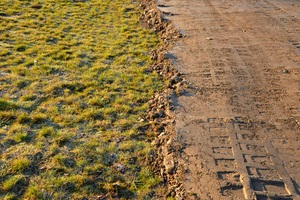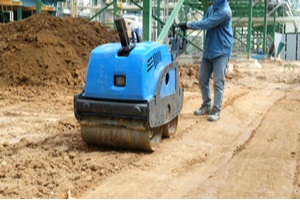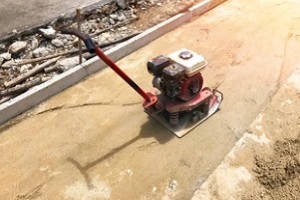Soil is an excellent surface for construction, but it must be compacted first to provide it with the necessary stability to support buildings, roads and other projects. Here is a look at what soil compaction entails and why it is so beneficial.
What Is Soil Compaction?
 You may have noticed that soil is not always flat. For example, when digging a hole in your garden, an area that began as a flat surface can quickly become a more aerated, crumbly pile. Imagine building something on top of this disturbed dirt; it would lack the support of dirt that is more packed together.
You may have noticed that soil is not always flat. For example, when digging a hole in your garden, an area that began as a flat surface can quickly become a more aerated, crumbly pile. Imagine building something on top of this disturbed dirt; it would lack the support of dirt that is more packed together.
Compacting soil gives it the flat base that is needed to support buildings, pavement, roads, construction foundations and other types of construction structures. It is considered an essential first step in building to provide soil with greater stability and higher resistance, and it is something that must be carried out carefully to avoid putting the completed structure in jeopardy.
It is particularly important when you consider the fact that soil is often disturbed by the various processes that are used in buildings, such as trenching, grading and excavating. These procedures can introduce air and water to the soil mass, and these water particles and air voids need to be removed so that whatever is built will be supported.
5 Benefits Of Soil Compaction
Here are five benefits of soil compaction:
It Can Keep Roads In Good Condition
Driving repeatedly over the same area of soil will compact it over time, eventually reaching the point where plants will be unable to grow in it. This is beneficial because plant roots can break apart soil and make it less stable for the roads above it. In addition, soil that is compacted is harder to wet and takes a lot of water to destabilize.
This means that when soil is compacted prior to laying concrete or asphalt roads, the roads will last longer. Compacting soil to build a highway also helps form the shape of the road in a manner that will allow it to shed water. For gravel roads, soil compaction means firmer soil and a more reliable base for small stones.
When soil is not compacted before a road is built upon it, the area could later experience unwanted movement of the soil and water could get beneath the road, potentially causing pipes underneath the roads to crack or leak and causing the road to develop holes and become insecure.
It Can Enhance Lawns
Soil compaction is also beneficial for lawns and other types of green spaces, such as golf courses and baseball parks. Compacting soil where grass will be grown helps to level it and make it more attractive. In areas where golf courses will be created, compacting the soil is essential so the putting greens will have a solid base on which to rest that will withstand heavy foot traffic.
It Helps To Support Buildings
 Many standard-sized buildings are built directly on top of soil, with footings that extend to bedrock generally reserved for taller buildings like skyscrapers. If soil is not compacted enough before construction begins, the house or building could eventually collapse. Soil needs to be dense enough to handle the weight of whatever is built over it. For this reason, building foundations are not usually constructed until the less compacted surface layer of the soil on the site has been removed and the entire surface has been mechanically compressed.
Many standard-sized buildings are built directly on top of soil, with footings that extend to bedrock generally reserved for taller buildings like skyscrapers. If soil is not compacted enough before construction begins, the house or building could eventually collapse. Soil needs to be dense enough to handle the weight of whatever is built over it. For this reason, building foundations are not usually constructed until the less compacted surface layer of the soil on the site has been removed and the entire surface has been mechanically compressed.
Failing to remove the air between soil particles before constructing something on top of it may result in the soil moving unexpectedly later and water absorbing or penetrating beneath the building. This may cause the walls of the buildings to crack easily and potentially fall down.
It Increases The Load Bearing Capacity Of Soil
One important property of soil in construction is its bearing capacity, which is its capacity to support the loads that are applied on the ground above it. Any time a load is placed on an area of the ground, such as a building foundation or a retaining wall, the soil needs to have the capacity to support it without excessive settlement. Compacting soil means that it will be able to support a greater weight.
It Can Have Desirable Effects On Plant Growth In Dry Weather
During a dry year at a very low bulk density, crop yields increase gradually as soil compaction rises. This is because slightly compacted soil speeds up the rate of seed germination by providing optimum seed-to-soil contact. In fact, corn planters are designed to offer moderate compaction using planter-mounted packer wheels following seed placement.
However, it is important to keep in mind that once soil compaction rises beyond the optimum level, the yields will begin to decline, and drought-stressed plants will suffer from decreased root growth.
How Is Soil Compacted?
In construction, soil is compacted using the combined action and force of tools such as vibrating and oscillating roller drums and the weight of the compaction machine that is carrying out the work. Some types of soil compaction equipment include vibratory rollers, sheepsfoot compactors, smooth drum rollers, trench rollers, forward plate compactors, reversible plate compactors and rammers.
The type of equipment used will depend on the properties of the soil as well as the amount of soil that needs to be compacted. For example, padfoot compactors and high amplitudes are better suited to cohesive soils, while vibratory smooth drum rollers and lower amplitudes are ideal for non-cohesive soils.
How Is Soil Compaction Measured?
 Soil compaction is typically stated in percentages, with a 95 percent compaction indicating the soil has been compacted to 95 percent of its possible density using compactive efforts. Ninety-five percent is a common target threshold for ensuring construction projects have a solid platform on which to stand. Lab testing is used to determine maximum dry density and optimum moisture content to provide a target for field compaction.
Soil compaction is typically stated in percentages, with a 95 percent compaction indicating the soil has been compacted to 95 percent of its possible density using compactive efforts. Ninety-five percent is a common target threshold for ensuring construction projects have a solid platform on which to stand. Lab testing is used to determine maximum dry density and optimum moisture content to provide a target for field compaction.
Discuss Your Project With The Northern Virginia Construction Professionals
To find out more about soil compaction, get in touch with the construction professionals at Dirt Connections. We offer residential remodeling and commercial construction services throughout the Northern Virginia area, and we can provide specific soil types as well as compaction, demolition and excavation work.
Summary

Dirt Connections was started with one goal in mind: providing quality residential and commercial construction services to clients on time and on budget. Reach out for more information on how we can support your next project.
For your convenience our estimates are free and by appointment. Call 703-940-9949 for a free estimate today!









































